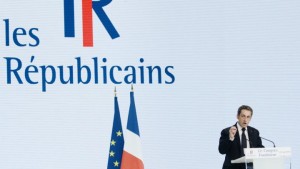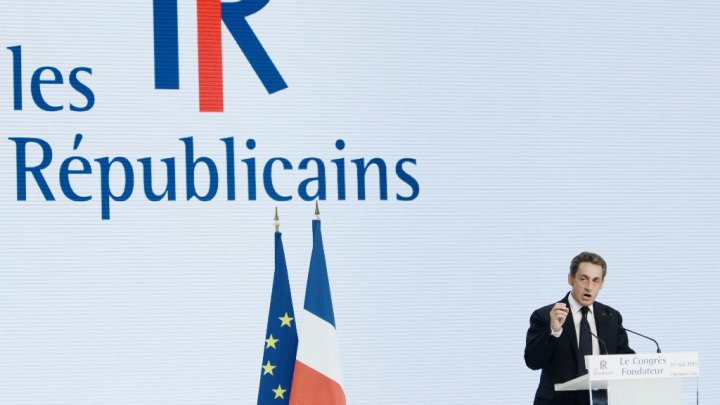Members of the right-wing Union for a Popular Movement (UMP) party last week approved Sarkozy’s proposal to rename their political organization Les Républicains in an online ballot. The name change is meant to help re-energise the party, which has been marred by bitter infighting and financial scandals in recent years.
The divisions that have threatened to tear apart France’s main opposition party nevertheless remain, and the Républicains now face the daunting task of establishing a clear political platform as it looks toward all-important presidential and parliamentary elections less than two years away.
The list of contentious issues is long, and Sarkozy – now party chief – wants to tackle the question of Islam first.
A daylong meeting entitled “Islam in France or France’s Islam” will be held at the party’s headquarters in the 15th arrondissement (district) of Paris on June 4. Party leaders, members of the Union of Islamic Organizations of France (UOIF) as well as experts on secularism have been invited to participate.
The French Council of the Muslim Faith (CFCM), among the invitees, declined to participate.
Sarkozy initially called for a meeting focusing on Islam during a UMP roundtable debate on February 7, declaring: “[The meeting] will not be to discuss what France can do to accommodate Islam, but what can be done so that Islam in France becomes the Islam of France.”
Muslims represent the second-largest religious community in France after Catholics. While French law forbids official surveys of the population based on race or religion, polls by private firms show Muslims make up 7.5 percent of the country’s total population today, or around 5 million people. Initially scheduled for April, the Républicains’ conference was moved to this week and has been declared off-limits for the media.
Members of the Républicains are the first to admit that they have struggled to see eye-to-eye on the issue in the past and urgently need to find common ground.
“There is such tension around these issues that we need to establish boundaries, rules. The worst thing would be to continue arguing among ourselves all the time,” French MP Henri Guaino told Le Monde in May. The newspaper reported that Sarkozy personally put Guaino and fellow MP Gérald Darmanin in charge of drafting the guest list for the June 4 meeting.
Indeed, the divide within the Républicans camp is wide, with MP Benoist Apparu, a former secretary of state for housing, declaring that he is against “secularist totalitarianism”, on the one side, and MP Eric Ciotti championing a bill to ban the Muslim veil in universities on the other.
The meeting itself has been the subject of discord. Even as party members try to show a united front during a critical moment for their political camp, some have publicly questioned the wisdom of focusing on religion instead of on France’s struggling economy.
“It appears that we’re saying that our priority, as a new political group, is Islam and the Republic; it’s a bad idea,” the party’s vice president, Nathalie Kosciusko-Morizet, told French news channel BFM-TV on May 10.
Kosciusko-Morizet, who has suggested she would run in the Républicains’ presidential primaries next year, expressed concerned that the party was too focused on social issues.
“Religious questions are taking up too much space in the country’s political debate,” she told BFM. “We have this tendency to wrap up our identity in religious debate.”
Kosciusko-Morizet, seen as a moderate force within the right-wing party, may have reason to worry. Sarkozy has given increasing importance to religion and Islam since his November 7 speech in Paris, now regularly cited in the French press as a keystone moment in his new tenure as party chief.
Speaking in the southern Parisian suburb of Dammarie-les-Lys on March 20, Sarkozy warned that “those who join us must assimilate; they must adopt our way of life, our culture”. While campaigning for nationwide departmental elections at the same time, he declared that he was opposed to offering alternative, non-pork lunches in schools and supported a bill to ban Muslim headscarves in universities.
Those stances have been hard for many leading figures within Sarkozy’s party to digest, including a trio of former prime ministers: François Fillon, Alain Juppé and Jean-Pierre Raffarin. Claude Goasguen, a veteran lawmaker representing the city of Paris, is another politician loudly objecting to the course Sarkozy has charted for the freshly rebranded party.
“The situation in France is so sensitive that we shouldn’t be adding more vinegar to it,” Goasguen told French news channel i-Tele on March 17, in reference to Sarkozy’s support for mayors who want to remove school-lunch alternatives. “It’s an extremist secular position that I do not share … within the UMP we are not all toeing the same line.”
Sarkozy has succeeded in casting the UMP’s name aside. It remains to be seen if he can do the same with its all-too-familiar contradictions.







